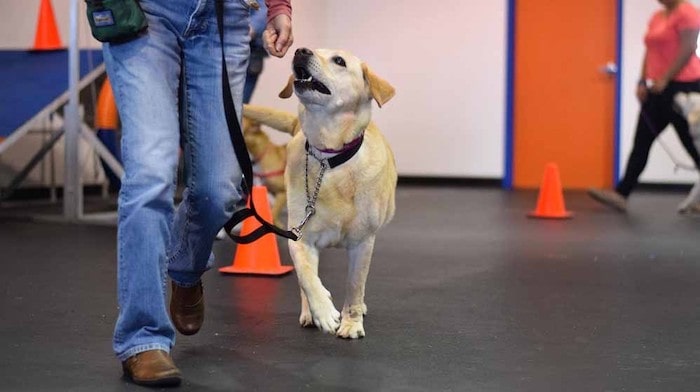When it comes to our furry friends, ensuring they have proper behavior training is of utmost importance. Training plays a vital role in shaping a dog’s behavior and overall well-being. It not only helps them become well-mannered and obedient but also enhances their quality of life.
Whether you have a mischievous puppy or a mature dog, behavior training is essential for a harmonious relationship between you and your canine companion.
Behavior training for dogs offers a wide range of benefits that go beyond just teaching them basic commands. It provides a means of communication, strengthens the bond between you and your four-legged friend, reduces stress, and ensures safety and control in various situations.
By investing time and effort into behavior training, you can create a positive and enriching environment for your dog, leading to a happier and healthier life together.
In the following sections, we will delve deeper into the specific benefits of behavior training for dogs, explore the different types of training available, and provide guidance on finding effective training programs near you.
So, whether you’re looking for puppy training near me or service dog training near me, this article will be your comprehensive guide.
Let’s embark on this exciting journey of understanding and enhancing your dog’s behavior through effective training techniques.
Benefits of Behavior Training for Dogs
Behavior training for dogs offers a multitude of benefits that go beyond mere obedience. By investing time and effort into training your furry companion, you can unlock a world of improved communication, enhanced bonding, stress reduction, and safety and control.
Improved Communication: Effective behavior training allows dogs to understand and respond to commands and cues, creating a clear line of communication between them and their owners.
This opens up a whole new level of interaction and understanding. Imagine being able to ask your dog to sit, stay, or even perform impressive tricks with just a simple command. Through training, dogs learn to recognize and interpret human signals, strengthening the bond between you and your four-legged friend.

1) Enhanced Bonding: Training sessions provide an opportunity for dogs and their owners to spend quality time together, fostering a deeper bond and strengthening the relationship.
The process of training requires patience, consistency, and positive reinforcement, all of which contribute to building trust and understanding.
As you work together towards a common goal, the shared experiences create a sense of teamwork and camaraderie, resulting in an unbreakable bond.
2) Stress Reduction: Dogs, like humans, can experience stress and anxiety. Behavior training can act as a powerful tool in reducing these negative emotions. Through training exercises, dogs learn to adapt to various situations, become more confident, and develop coping mechanisms.
This newfound resilience helps them navigate stressful environments and handle everyday challenges with ease. Additionally, training offers mental stimulation, keeping their minds engaged and preventing boredom, which can contribute to anxiety in dogs.
3) Safety and Control: A well-trained dog is a safer dog. Training instills discipline and teaches dogs appropriate behavior, ensuring their safety and the safety of those around them. Dogs that respond to commands reliably are less likely to engage in dangerous behaviors such as running into traffic or approaching aggressive animals.
Training also provides owners with control over their dogs, allowing them to guide and manage their behavior in different situations.
By understanding the benefits of behavior training, you can make an informed decision to invest in your dog’s well-being and development. Whether you’re interested in obedience training, socialization training, aggression training, house training, or leash training, there are numerous options available to suit your specific needs.
Continue reading to learn how to find effective behavior training for dogs near you.
Types of Behavior Training for Dogs
When it comes to behavior training for dogs, there are various methods and approaches that can be employed to shape their behavior and ensure they are well-behaved companions. Each type of training serves a specific purpose and addresses different aspects of a dog’s behavior.
Obedience training is one of the most common and essential forms of training. It focuses on teaching dogs basic commands such as sit, stay, come, and heel, enabling them to respond to their owner’s instructions promptly and reliably.
1) Socialization training is another vital aspect of behavior training for dogs. This type of training exposes dogs to various social situations, environments, and other animals. By introducing them to different people, animals, and experiences, dogs learn how to interact appropriately, reducing the likelihood of aggression or fear-based behavior. Socialization training also helps dogs develop confidence and become well-adjusted members of society.
For dogs that display aggressive behavior, aggression training is necessary to address and manage their aggression effectively. This type of training is typically conducted by experienced trainers who specialize in dealing with aggressive dogs. They use proven techniques to modify the dog’s behavior, helping them become less reactive and more controlled in situations that trigger their aggression.

2) House training, also known as potty training, is an essential aspect of behavior training, especially for puppies. It involves teaching dogs where and when to eliminate waste. Through consistent reinforcement and positive reinforcement, dogs learn to hold their bladder and bowel movements until they are in an appropriate location.
3) Another crucial type of behavior training is leash training. This training focuses on teaching dogs to walk calmly and obediently on a leash without pulling or lunging. Leash training helps ensure the safety of both the dog and the owner during walks and outings.
While these are some of the primary types of behavior training for dogs, it’s important to note that there are other specialized training programs available as well.
These include puppy training, service dog training, clicker training, agility training, therapy dog training, crate training, and training for separation anxiety, among others. Each of these programs targets specific behaviors or skills and can provide additional benefits to dogs and their owners.
To find more information about specific training programs and services such as puppy training near me, dog obedience classes near me, or private dog trainers near me, check out Dog Loves Best. They offer comprehensive resources and guidance to help you find the best training options for your furry friend.
Finding Effective Behavior Training Near You
When it comes to finding effective behavior training for your beloved four-legged friend, it’s crucial to explore your options and choose the right trainer. Researching local dog trainers is the first step in this process.
Start by compiling a list of trainers in your area, either by searching online or asking for recommendations from friends, family, or your veterinarian.
It’s important to find trainers who specialize in the specific type of training you’re looking for, whether it’s puppy training near you, service dog training, clicker training, or agility training.
Once you have a list of potential trainers, reading reviews and testimonials can provide valuable insights into their reputation and success rate. Look for trainers who have a track record of positive outcomes and satisfied clients. Online platforms, such as Dog Loves Best, offer comprehensive reviews and ratings for trainers in your area, making it easier to make an informed decision.
Considering training methods is another crucial aspect of finding the right behavior training for your dog. Different trainers may employ various techniques, such as positive reinforcement, dominance-based training, or clicker training.

It’s important to choose a method that aligns with your values and the temperament of your dog. For example, if you’re interested in leash training for dogs, you might want to find a trainer who specializes in force-free methods.
To truly evaluate the suitability of a trainer, visiting their training facilities can provide valuable insights. This allows you to see firsthand the environment in which your dog will be trained and assess the trainer’s professionalism and expertise.
Look for a clean and well-maintained facility with ample space for training exercises. It’s also important to observe how the trainer interacts with the dogs under their care.
In addition to researching and visiting trainers, don’t hesitate to ask for referrals. Reach out to other dog owners, local pet stores, or even your veterinarian for recommendations. Referrals can offer a personal perspective on the effectiveness and reliability of a trainer, giving you peace of mind in your decision-making process.
By following these steps and conducting thorough research, you can find an effective behavior training program that meets your dog’s needs. Remember to ask specific questions during the selection process, such as the trainer’s philosophy, the duration of the training program, the cost, and the availability of follow-up support.
With patience and diligence, you’ll be well on your way to finding a trainer who can help you and your furry companion build a strong foundation of obedience and trust.
FAQs
Understanding a dog trainer’s philosophy is essential in determining whether their approach aligns with your beliefs and goals. Some trainers may prioritize positive reinforcement, using treats or praise to reward desired behaviors. Others may focus on dominance-based techniques or clicker training. By asking this question, you can gain insight into a trainer’s methods and evaluate if they resonate with your values.
Every dog is unique, and the duration of the training process can vary depending on factors such as your dog’s age, temperament, and the specific behaviors you want to address. It’s important to have a realistic expectation of the time commitment involved. By asking this question, you can gauge the trainer’s expertise and get a rough estimate of the timeline required for your dog’s training journey.
While cost should never be the sole determining factor, it’s essential to have a clear understanding of the financial investment required for behavior training. Dog trainers may offer various packages, such as group classes or private sessions, each with different price points. By asking about the cost upfront, you can evaluate the affordability of the program and ensure it fits within your budget.
Behavior training is a process that requires consistency and ongoing reinforcement. It’s crucial to inquire about the trainer’s availability for follow-up support once the initial training sessions are complete. Some trainers may offer additional resources, such as phone consultations or group practice sessions, to help you and your dog maintain the progress achieved during the training program. Asking about follow-up support ensures that you have access to continued guidance and assistance when needed.
Asking these questions will not only provide you with valuable information but also demonstrate your commitment to finding the best possible training for your dog. Remember, the more you know about a potential dog trainer, the better equipped you will be to make an informed decision that sets you and your four-legged friend up for success.
If you’re interested in learning more about specific types of dog training, check out our articles on puppy training near me or service dog training near me. Additionally, if you’re curious about different training techniques, you might find our articles on clicker training for dogs or agility training for dogs helpful.
Conclusion
In conclusion, behavior training for dogs is a crucial aspect of responsible pet ownership. It not only benefits the dog but also enhances the overall relationship between the dog and its owner. By investing time and effort into behavior training, dog owners can unlock a world of possibilities and ensure a harmonious coexistence with their furry companions.
Through effective behavior training, dogs can learn to communicate more effectively with their owners, leading to a deeper understanding of their needs and desires. This improved communication allows for a stronger bond to develop, built on trust and mutual respect. As a result, both the dog and the owner experience a heightened sense of companionship and fulfillment.
Moreover, behavior training has the added benefit of reducing stress levels for both dogs and their owners. Dogs that receive proper training are more likely to exhibit well-adjusted behaviors, which in turn leads to a calmer and more relaxed household environment. By providing dogs with the necessary tools to cope with different situations, owners can alleviate anxiety and promote a sense of security.
Behavior training also plays a vital role in ensuring the safety and control of dogs. Through obedience training, dogs learn commands and cues that allow them to navigate the world around them safely. Whether it’s teaching them to sit and stay, or to walk calmly on a leash, these skills are essential for their well-being and the well-being of those around them. By instilling a sense of discipline and control, behavior training empowers owners to confidently manage their dogs in various situations.
When seeking effective behavior training for dogs, it is important to research local dog trainers and consider their training methods. Reading reviews and testimonials from other dog owners can provide valuable insights into the trainer’s expertise and success rate. Visiting training facilities allows prospective owners to observe the training environment and assess its suitability for their dog’s needs. Additionally, asking for referrals from trusted sources can help in finding reputable trainers who have a track record of delivering quality training programs.
Before finalizing a decision, it is crucial to ask potential dog trainers important questions. Inquiring about their training philosophy ensures that their methods align with the owner’s values and goals. Understanding the duration of the training process and the associated costs allows owners to plan accordingly. Furthermore, inquiring about follow-up support ensures that ongoing assistance is available to address any future challenges that may arise.
In conclusion, behavior training for dogs is an investment that yields numerous benefits. It fosters improved communication, strengthens the bond between dogs and their owners, reduces stress levels, and enhances safety and control. By finding effective behavior training near you, you can embark on a journey of growth and development with your furry friend. Remember, a well-trained dog is a happier and more fulfilled companion.

Ellis is a retired veterinary technician and full-time contributor at DogLovesBest. He likes writing about pet health care tips and reviews the products that are useful for fidos on a daily basis.
Ellis also guardians a Siberian husky, Nova, and a cat named Shilly. They all live happily with his wife Ammy, and both the dogs on a seaside apartment in Queens, NY.
